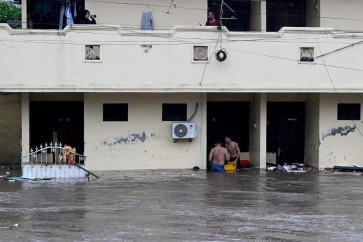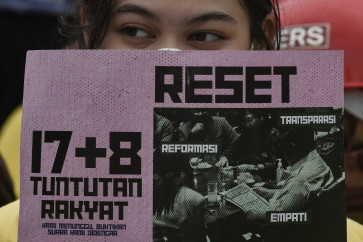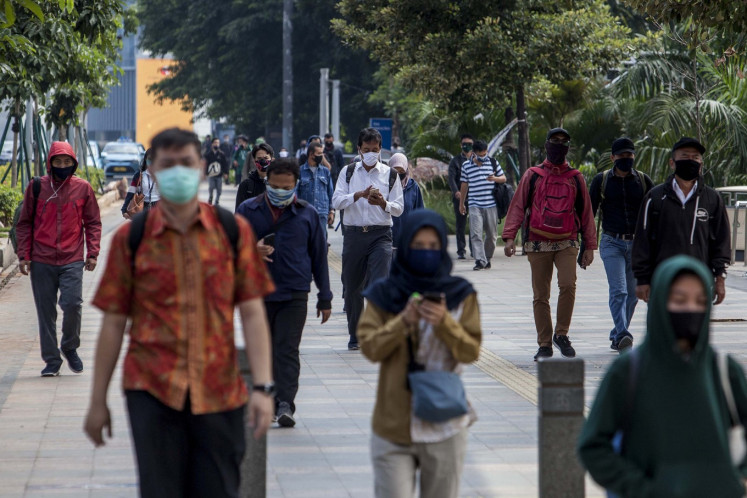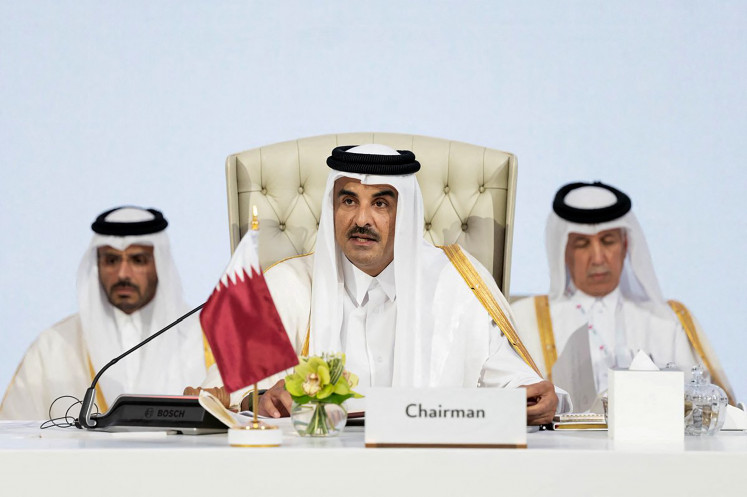Popular Reads
Top Results
Can't find what you're looking for?
View all search resultsPopular Reads
Top Results
Can't find what you're looking for?
View all search resultsPoor knowledge leads to prolonged discrimination against LGBT people
Itâs not an illness: A member of the Indonesian LGBT community displays a placard stating that homosexuality is not a mental illness
Change text size
Gift Premium Articles
to Anyone
I
span class="caption">It's not an illness: A member of the Indonesian LGBT community displays a placard stating that homosexuality is not a mental illness. Rights groups have said recent comments by public figures condemning LGBT people are ill-informed and risk triggering discrimination. (Tempo)
Mounting public debate over lesbian, gay, bisexual and transgender (LGBT) protections, some of which is based on unclear arguments, has highlighted Indonesian people's poor understanding of the life situations of LGBT people in the country.
'LGBT people must be banned just like we banned communism and drug trafficking,' Hanura Party secretary-general Berliana Kartakusumah said in a discussion at the House of Representatives on March 4.
Previously, Berliana had reportedly made several offensive statements against the LGBT community. In one of his statements, the lawmaker said: 'LGBT is an infectious and dangerous disease.' He also said: 'LGBT endangers the preservation of human life.'
Berliana's call for the banning of LGBT people has drawn criticism as some people consider LGBT issues to be all about gender identity and sexual orientation. Therefore, they say, the LGBT movement is incomparable to both communism, which is an economic system, and drug trafficking, which is a criminal act as stipulated by law. Those three things, namely LGBT issues, communism and drug trafficking, have different contexts in the society, they say. Besides, no law restricts LGBT activities in Indonesia; hence, the state is obliged to protect their human rights as citizens of the country.
The American Psychiatric Association's Diagnostic and Statistical Manual of Mental Disorders removed homosexuality as a mental illness in 1973. The World Health Organization also removed it from its list of psychiatric disorders in May 1990.
Unfortunately, referring to the 2014 Mental Health Law, the Indonesian Psychiatrists Association (PDSKJI) has recently categorized homosexuals and bisexuals as 'people with psychiatric problems', while transgender are people with 'mental disorders'.
Berliana's statement that LGBT orientations endanger the preservation of human life is considered to have a weak argument as well. An article entitled 'The Causes of Extinction' written by a biologist and geneticist John Maynard Smith in 1989 explains that a species may go extinct either because it is unable to evolve rapidly enough to meet changing circumstances, or because its niche disappears and it has no capacity for the rapid evolution that could have saved it.
Reny Kistiyanti, executive director of Talita Kum, a study institute for lesbians, bisexuals and transgenders in Surakarta, said on Friday less information about LGBT issues might have resulted from a lack of education about LGBT people in society. Such a poor understanding on LGBT issues was related to the patriarchal and heteronormative cultures that were still deep-rooted in the country, she added.
'Hence, feminine men or vice versa are perceived as if they have violated the norms -- either men's norm because they appear not masculine enough or women's norm because they shouldn't be masculine,' Reny said.
She added that such ways of thinking had created homophobias in society and these had justified violence against LGBT people.
As reported in media, in 2014 the Indonesian Ulema Council (MUI) issued an edict that declared LGBT people haram (forbidden by Islamic law). Recently, media also reported threats against LGBT communities, such as those directed at an Islamic boarding school for transgender students in Yogyakarta, which was shut down last month amid pressure from locals and hard-line groups.
'This violence is the result of homophobia and trans-phobia, because LGBT people are perceived as deviant and guilty or suffering illnesses,' Reny said. 'It's too much if personal preferences are perceived as a threat to national security.'
Setara Institute researcher Ismail Hasani said on Friday phobias against LGBT people could be symptoms of the rise of conservatism in Indonesia. Currently, people could judge easily about everything perceived different with the country's mainstream cultures.
'It seems that the discrimination against LGBT people is institutionalized through the government's policies and laws,' Ismail said.
'Conservatism and fundamentalism will always rise in a susceptible society, in which this could happen because of the lack of citizenship education.'
Ismail added that it would be more dangerous if lawmakers were promoting their phobias through hate speeches and the public was quietly condoning it.
He said judgments by a public figure could be a sociological theorem underlying people's inclinations to condemn LGBT people.
Rio Damar, the founder of Melela.org, a website for coming-out stories, shared similar views. 'Most people who cast judgment must have little knowledge of what LGBT issues really are. Human judgment tends to be incomplete and flawed and, therefore, we should approach it with humility,' said Rio on Saturday.
'We have always been very easy to draw a conclusion prematurely, although more information about a person we think about might help us enrich our understanding of that person. Such a tendency may also lead us astray, since we often lack of the whole story,' he added.
Recently, the National Commission on Human Rights (Komnas HAM) called on the government to ensure the fulfillment of the fundamental rights of all Indonesian citizens, including LGBT people. The commission said the state must use a humanistic approach in handling LGBT issues.
'The state has an obligation to protect LGBT people from phobias that lead to violence,' Komnas HAM member Imdadun Rahmat said on March 4.
'Do not let them be discriminated against and be prevented from obtaining their rights to decent work, health services or freedom of expression. The state has to be there for them.' (vps/ebf)(+)










